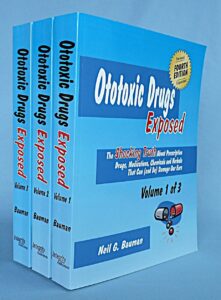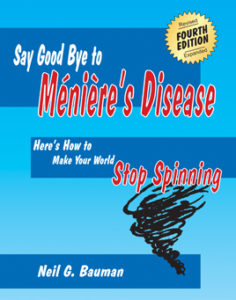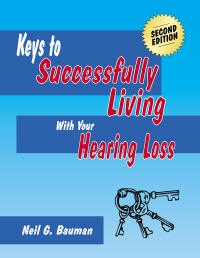by Neil Bauman, Ph.D.
A man asked,
A product called “Reconnect” by IVL [Institute for Vibrant Living] and Dr. Devin Mikles, M.D. has my attention. Can you give me any information about the validity of this product?
“RECONNECT” seems to be the latest “hearing support supplement” to hit on the market. You can read their product information including their product label showing a list of all the ingredients and amounts here.
In reading through the list of ingredients, I don’t see anything harmful, so if “RECONNECT” does anything for your ears, it should be helpful.
However, is it really helpful? I have my doubts that a product that needs a slick 20-page “brochure” full of hype and half-truths to stir up your emotions so you’ll buy it is really going to help your ears much. One thing for sure though, it IS good for the seller’s wallet!
[Update: when I looked on June, 2015, I could not find this slick brochure on their website anymore.]
This brochure is long on hype and short on facts. It alludes to studies, but never directly quotes the recommendations from these various studies, so you don’t know the proven effective doses of the various ingredients given in those studies.
Here is one example that I happen to be familiar with. “RECONNECT” contains the herbal Ginkgo biloba. So far, so good, since Ginkgo is good for our ears. However, there’s a catch.
Notice that in the list of ingredients it says each capsule contains “Ginkgo Biloba (leaf) 15 mg”. They recommend you take two capsules a day. Thus, you’d be getting 30 mg of Ginkgo leaf per day.
The question is, “Will taking 30 mg of Ginkgo leaf a day significantly help our ears?” To answer this question we have to consider two things. First, we need to know whether the active ingredients in Ginkgo are present, and second, if so, are they present in significant quantities in 30 mg of Ginkgo leaf to make a significant difference to our ears?
How much of the active ingredients are present? Who knows? All it says is “Ginkgo (leaf)” with no indication if even any active ingredient is present. (The active ingredient could be in the leaves, or it could be in the bark, or in the roots, etc. In the past, unscrupulous manufacturers have just packed part of the plant into their capsules without regard to whether the active ingredient was even present in that part of the plant, or present at that stage of the plant’s life cycle. Then they’d label it as containing a certain amount of that plant [which would be true], but without an effective amount of the active ingredient(s), that plant material doesn’t do you any/much good.)
In order to be effective, you need to know that you are getting an effective dose of the active ingredients. The way you know this is when the manufacturer specifically states that the contents of each capsule are standardized to a certain percentage of the active ingredients.
In this case, there is no such statement. As stated on page 143 in my book, “When Your Ears Ring” (1), in order to be effective for tinnitus, Ginkgo biloba extract should be standardized to contain 24% flavone glycosides, 6% terpene lactones and a minimum of 2.6% bilobalide.
Does “RECONNECT” contain this? Almost certainly not since the manufacturer does not state this. A further clue is that it only contains Ginkgo “leaf”, not a standardized Ginkgo extract.
To answer the second question, we need to know if there is enough of the above three active ingredients to produce an effective result.
Incidentally, opponents to Ginkgo point to a number of studies have shown that Ginkgo is not effective in treating tinnitus. Why did these studies show Ginkgo to be ineffective? Because the researchers, deliberately (or otherwise), conducted the study using less than the effective therapeutic dose of the active ingredients.
For example, on page 144 in my book, “When Your Ears Ring” (1) I wrote: “There have been studies that show that Ginkgo does not work for tinnitus, but you need to check into these studies to see what level of Ginkgo extract was used. For example, one study of 978 people concluded that Ginkgo didn’t work. However, the people in this study were only given 150 mg of Ginkgo extract a day, which is less than one third of the 480 mg per day needed to be clinically effective according to the German Commission, one of the authorities on the use of Ginkgo.”
Notice that the effective dose is 480 mg per day of standardized Ginkgo extract in contrast to “RECONNECT’s” paltry 15 mg of “Ginkgo leaf” per capsule.
The “RECONNECT” brochure cites this German Commission by name, but does not give their dosage recommendations, so you don’t realize that you are not getting an effective dose. The moral of this story is that if you are going to use Ginkgo, make sure you take an effective dose if you want effective results for your tinnitus. (Even then, Ginkgo doesn’t work for everyone with tinnitus.)
This is just one example of how “RECONNECT” may use good herbals, but by not containing an effective dose, you are essentially wasting your money.
Let’s look at another ingredient in the “RECONNECT” formula, the mineral magnesium. Magnesium helps protect our ears from damage caused by loud sounds (which they also state). However, the Recommended Dietary Allowance (RDA) of magnesium for adults is 320 mg (women) and 420 mg (men) (and the therapeutic dose is quite a bit higher). Incidentally, a number of studies have shown that many people are deficient in magnesium. Thus, adding magnesium to your diet can be beneficial to your ear’s health.
“RECONNECT” addresses this lack of magnesium by adding 25 mg of magnesium asparate to each capsule. As they correctly state, this is only 6% of the RDA. What they don’t explain is that magnesium asparate only contains 10% elemental magnesium. Thus the 25 mg of magnesium asparate really only contains 2.5 mg of magnesium, a minuscule half of 1% of the RDA for magnesium. Can you believe that this extra minuscule amount of magnesium is going to correct a significant magnesium deficiency, and thus help your ears? You need an effective dose of magnesium to improve your ear health, not just a token amount.
From these two examples, you can see that while the ingredients may be good for your ears, unless you get an effective dose, you can’t expect much of anything to change.
In addition to not containing effective doses of various ingredients, the brochure is replete with a lot of testimonials that make you think this supplement will improve your hearing, reduce your tinnitus, get rid of your vertigo or Meniere’s disease, etc.
There are two points to consider here as well. First, there is the placebo effect. Someone studied this effect and found that around 17% of the people taking a placebo had positive results, at least in their own minds. The funny thing was it didn’t matter whether the people in the study knew they were taking the placebo or the drug being tested. The placebo effect kicked in just the same. I think the same thing is happening here too.
Second, advertising testimonials are typically “cherry-picked” for the best of the best. This means these testimonials are not the typical or average results you could expect.
Thus, they prey on your emotions and lead you to believe you’ll have results this good or even better! For example on page 9 of the brochure you’ll find this statement, “RECONNECT may be even better than the testimonials in this publication.” They may be, but most likely you will find that you have no such luck.
Here’s some more hype, “By rebuilding the 15,000 sensory hair cells that transmit sound from your ear to your brain, RECONNECT can help you hear what you’ve been missing.” (p. 10.)
The truth is that most people that lose hearing do so because the hair cells die—and “RECONNECT” cannot resurrect dead hair cells. At the most, it can only help rejuvenate “sick” hair cells.
It continues, “And who knows, you could soon get rid of your hearing aids.” Again, they are preying on your emotions by building hope that you can dump your hearing aids with the statement, “who knows”. The truth is “no one knows”, nor is it likely to happen. If it was true, then all audiologists and hearing aid dispensers could be selling “RECONNECT” and quit selling hearing aids. But you know this is not happening.
On the last page it says, “It’s time to RECONNECT and get rid of all your hearing problems!” I have news for them. nothing is going to get rid of all my hearing problems. I was born with both a severe hearing loss and tinnitus, and to imply that I can take “RECONNECT” and all my hearing problems magically go away is just a big fat lie to try to get me to shell out the bucks for their supposed remedy.
Based on how fast and loose the people at “RECONNECT” have been with the truth, and how chintzy they are with the size of the dose of the various ingredients (and I’ve only mentioned 2 of the 15 ingredients), I personally wouldn’t waste my money on this product. But, as I said earlier, I don’t see anything wrong with the ingredients. They have the potential to help, but in the quantities provided in each capsule, I can’t see them helping anyone that has a real problem with their ears.
________
(1) Bauman, Neil. 2013. “When Your Ears Ring—Cope with Your Tinnitus—Here’s How“.



What about the fact that the Attorney General has come out saying that RECCONNECT has unsafe levels of lead?
Hi Tom:
If that’s the case, then don’t take it. I was only talking about the listed ingredients. If they are contaminated with lead, that’s another story.
Regards
Neil
Thanks Neil, for this comment. I have received a broshure that looked great but as with a lot of these products, I tend to go to the internet to see what comments are made and the BBB’s comments are deceiving in that they followed thru to ” make it right with the customer”. that is not a great post.
i will not purchase the product.
Mr. Bauman,
I have contacted you before about my sudden hearing loss, 5 years ago after my major back surgery. I was given steroids upon leaving the hospital after that one week stay following the sudden hearing loss! I have since read in the Consumer Reports on Health, July 2014 issue that there is some VERY IMPORTANT information that you might want to pass on to your readers. SUDDEN DEAFNESS — TREATMENT WINDOWS is only a 72 hour period! I SO WISH I had had this information 5 years ago. It is two late for me to sue the hospital for damages, as that 2 year window has expired. I am going to try to request a visit with that hospital administrator so that he CAN BE MADE AWARE of this small window for treatment for SUDDEN HEARING LOSS (SSHL)and he can make sure that no other patients in his ER have this terrible loss permanently as I have. I keep hoping & praying for a miracle. I am MOST thankful that the LORD has given me a tiny bit of my hearing back and with the help of modern technology, I am surviving, but the stress of trying to hear is an enormous daily task. Praising you for you ongoing work.
Sincerely,
Marianne M Lindsay
Hi Marianne:
I’m not so sure that the 72 hour window is all a person has, but there is no doubt that the quicker treatment is started, the better the outcome. If you are treating sudden hearing loss with antioxidants, then you NEED to do that in the same day or the next two days after the hearing loss. If you are treating sudden hearing loss with Prednisone, then apparently the time frame isn’t quite as rigid, but the sooner the better.
As far as treatment with Prednisone goes, sometimes it works and sometimes it doesn’t. One study showed that hearing comes back spontaneously about 1/3 of the time without any treatment, or in spite of any treatment, that hearing never comes back about 1/3 of the time no matter how soon treatment is given, and thattimely use of Prednisone works approximately 1/3 of the time.
Now, here’s the catch. If you take Prednisone and your hearing comes back, your doctor will say, “See, the Prednisone worked!” What both of you don’t know is whether your hearing would have come back even without treatment. Thus the efficacy of Prednisone is probably vastly overrated.
Where you really need timely Prednisone treatment is those approximately 1/3 of the cases where hearing comes back BECAUSE of the Prednisone–and s-ince you don’t know which of the three classes you are in, it is prudent to take the Prednisone if you think there is a possibility it will help you.
As for me, I’d go the anti-oxidant route immediately as I think it works better and has fewer side effects than the Prednisone route.
Another thing to note is that the worse your sudden hearing loss, the less the chances of getting all/most of your hearing back. You are a good example. You suffered almost total hearing loss and youe just got a little bit back. That fits with my experience. If you had say a 40 dB hearing loss, then you might have gotten 20 to 30 dB back and would have almost normal hearing. This is my rule of thumb so there are exceptions both ways, but it gives an idea of what you might expect.
Regards
Neil
THANKS FOR A REALISTIC AND ACCURATE EVALUATION OF RECONNECT
I TOO FOUND OUT THE HARD WAY ABOUT SUDDEN HEARING LOSS. A PERSON ACTUALLY HAS A MAXIMUM 10 DAY PERIOD TO HAVE INTERVENTION DONE, SURGERY, STEROID FLUSH, ETC. I WAS LUCKY. MY HEARING WAS AT 3%. AFTER 3 EAR SURGERIES, WHERE THE INNER EAR WAS WORKED ON, I REGAINED 90%. AFTER 1 YEAR I LOST 5%, BUT NO MORE LOSS SINCE THEN. RUN TO A GOOD E.N.T.!
I too had sudden hearing loss without follow-up, even though I worked at a hospital and spoke to the head of the Speech and Hearing Department. Never knew about a treatment that could possibly reverse the loss. I then began to use hearing aids somewhat satisfactorily but, alas, several years later, my good ear was suddenly worse. I immediately visited my audiologist who simply ramped up the device for that ear. As you can see, even the professionals weren’t aware of helpful possibilities!!!!! Now that I know more, I feel cheated and betrayed by the practitioners i trusted!!!!! In addition, I had considered purchasing Reconnect. After all the comments above, that has been scratched!!!!!
Ive had reconnect checked by an independent lab,, they say they could sell a bottle for $10 each and make a good profit. The ingredients are very inexpensive. However a test will be done by several hard to hearing , with a hearing test.. A test will follow at 3 months,, and compared,, if it is good,, we will praise he company,, if it is bad,, we will sent thousands of notices on twitter and facebook,, and try shutting them down.. so good luck,,, the time is starting now,,,1/5/2015
I also have very bad hearing and I have wasted my money trying Reconnect it is all lies and to epenese!!!
After 2 months, i Have no results,, my tinnitus is worst. Im afraid it is only good for the seller, but I will continue to use for one more month,,, then ask for my money refunded. Also thousands of messages will be on facebook, and twitter.
My friend has advised me, some of the name of uses on the slick bulletin are now deceased,, but they are looking for more that recomemded it….I will report again after another month.
As a believer in alternate medicine, I take a number of vitamins every day. I also have hearing aids ( over 40% hearing loss)and was glad to read your review of Reconnect and save me $$!
Thank you.
I did not have great hopes that Reconnect would do much for my hearing, but I thought it might be of help for the Tinnitus. I have taken it for two months and it did nothing. Just as if I had not taken it at all.
Dear Dr. Bauman,
I don’t usually post much on the internet, but I feel compelled to thank-you for revealing the detail in your review about Reconnect.
I will not now be buying this product, and because of your integrity shown here, I am going to find your book to buy.
I have Tinnitus, mild hearing loss, and an ongoing imbalance problem.
Thank-you so much for researching such “snake-oil products”.
J. Thurman